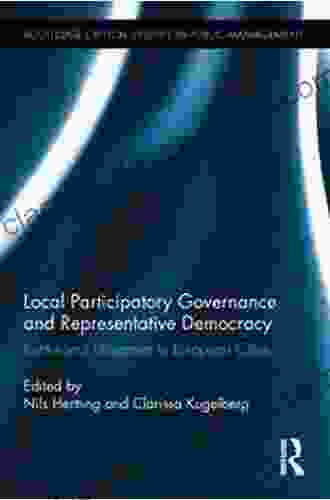Institutional Dilemmas in European Cities: Routledge Critical Studies in Public Management and Governance

European cities are facing a number of institutional dilemmas in the context of globalization and austerity. These dilemmas are particularly acute in the context of austerity, which has led to cuts in public spending and a decline in the quality of public services.
4.5 out of 5
| Language | : | English |
| File size | : | 2448 KB |
| Text-to-Speech | : | Enabled |
| Enhanced typesetting | : | Enabled |
| Word Wise | : | Enabled |
| Print length | : | 210 pages |
| Screen Reader | : | Supported |
One of the most pressing dilemmas is the need to attract investment and promote economic growth on the one hand, and the need to provide essential services and protect social welfare on the other. This dilemma is particularly acute in cities that are competing for investment from global corporations. In order to attract investment, cities often offer tax breaks and other incentives to corporations, which can lead to a decline in revenue for essential services such as education and healthcare.
Another dilemma is the need to balance the interests of different stakeholders. Cities are home to a diverse range of stakeholders, including residents, businesses, and community groups. Each of these stakeholders has different needs and interests, and it can be difficult to find a balance that satisfies everyone. For example, residents may want to see more spending on public services, while businesses may want to see lower taxes. Community groups may want to see more investment in affordable housing, while developers may want to see more investment in luxury housing.
These dilemmas are not easy to solve, and there is no one-size-fits-all solution. However, it is important for cities to be aware of these dilemmas and to develop strategies to address them. By ng so, cities can create more sustainable and equitable communities.
The Impact of Globalization on European Cities
Globalization has had a profound impact on European cities. On the one hand, globalization has led to increased investment and economic growth in many cities. On the other hand, globalization has also led to increased inequality and social unrest in many cities.
One of the most significant impacts of globalization on European cities has been the growth of the service sector. In the past, many European cities were centers of manufacturing. However, in recent decades, manufacturing has declined in many cities, and the service sector has grown. This has led to a change in the economic profile of many cities, and it has also led to a change in the social fabric of many cities.
Another significant impact of globalization on European cities has been the increase in migration. In recent decades, many European cities have seen an influx of migrants from other countries. This has led to a change in the demographic profile of many cities, and it has also led to a change in the cultural landscape of many cities.
Globalization has also had a significant impact on the governance of European cities. In the past, many European cities were governed by local elites. However, in recent decades, there has been a trend towards more participatory and democratic forms of governance. This trend has been driven by a number of factors, including the growth of the middle class, the increase in education levels, and the rise of social movements.
The Impact of Austerity on European Cities
Austerity has had a significant impact on European cities. Austerity is a set of economic policies that are designed to reduce government spending and debt. These policies have been implemented in many European countries in response to the financial crisis of 2008.
Austerity has led to cuts in public spending in many European cities. These cuts have had a negative impact on a wide range of public services, including education, healthcare, and social welfare. Austerity has also led to an increase in unemployment and poverty in many European cities.
The impact of austerity on European cities has been particularly severe in cities that are heavily dependent on public spending. For example, cities in Southern Europe, which have large public sectors, have been hit particularly hard by austerity. These cities have seen sharp declines in public spending, which has led to a decline in the quality of public services and an increase in unemployment.
Institutional Dilemmas in European Cities
The dilemmas faced by European cities in the context of globalization and austerity are complex and challenging. These dilemmas are not easy to solve, and there is no one-size-fits-all solution. However, it is important for cities to be aware of these dilemmas and to develop strategies to address them. By ng so, cities can create more sustainable and equitable communities.
The Need to Attract Investment and Promote Economic Growth
One of the most pressing dilemmas faced by European cities is the need to attract investment and promote economic growth. In the context of globalization, cities are competing for investment from global corporations. In order to attract investment, cities often offer tax breaks and other incentives to corporations. This can lead to a decline in revenue for essential services such as education and healthcare.
There are a number of ways that cities can attract investment and promote economic growth without sacrificing essential services. One way is to invest in infrastructure and education. This makes cities more attractive to businesses and residents alike. Another way is to develop a diversified economy. This reduces the risk of economic downturns and makes cities more resilient to economic shocks.
The Need to Provide Essential Services and Protect Social Welfare
Another dilemma faced by European cities is the need to provide essential services and protect social welfare. In the context of austerity, cities are facing cuts in public spending. This has led to a decline in the quality of public services and an increase in unemployment. This dilemma is particularly acute in cities with large populations of poor and vulnerable residents.
There are a number of ways that cities can provide essential services and protect social welfare without increasing spending. One way is to improve the efficiency of public services. This can be done by investing in technology and training staff. Another way is to develop partnerships with non-profit organizations. These partnerships can help to provide services that the city cannot afford to provide on its own.
The Need to Balance the Interests of Different Stakeholders
Another dilemma faced by European cities is the need to balance the interests of different stakeholders. Cities are home to a diverse range of stakeholders, including residents, businesses, and community groups. Each of these stakeholders has different needs and interests, and it can be difficult to find a balance that satisfies everyone.
There are a number of ways that cities can balance the interests of different stakeholders. One way is to involve stakeholders in the decision-making process. This ensures that all voices are heard and that decisions are made in a transparent and accountable way. Another way is to develop partnerships between different stakeholders. These partnerships can help to build trust and cooperation between stakeholders.
The dilemmas faced by European cities in the context of globalization and austerity are complex and challenging. However, it is important for cities to be aware of these dilemmas and to develop strategies to address them. By ng so, cities can create more sustainable and equitable communities.
4.5 out of 5
| Language | : | English |
| File size | : | 2448 KB |
| Text-to-Speech | : | Enabled |
| Enhanced typesetting | : | Enabled |
| Word Wise | : | Enabled |
| Print length | : | 210 pages |
| Screen Reader | : | Supported |
Do you want to contribute by writing guest posts on this blog?
Please contact us and send us a resume of previous articles that you have written.
 Book
Book Novel
Novel Chapter
Chapter Text
Text Story
Story Library
Library Paperback
Paperback E-book
E-book Paragraph
Paragraph Shelf
Shelf Glossary
Glossary Foreword
Foreword Preface
Preface Synopsis
Synopsis Footnote
Footnote Codex
Codex Tome
Tome Bestseller
Bestseller Classics
Classics Narrative
Narrative Biography
Biography Autobiography
Autobiography Memoir
Memoir Reference
Reference Encyclopedia
Encyclopedia Thesaurus
Thesaurus Narrator
Narrator Character
Character Librarian
Librarian Card Catalog
Card Catalog Stacks
Stacks Archives
Archives Periodicals
Periodicals Lending
Lending Reserve
Reserve Academic
Academic Special Collections
Special Collections Thesis
Thesis Book Club
Book Club Theory
Theory Rosebud Ben Oni
Rosebud Ben Oni Massimo Fini
Massimo Fini Michelle Madow
Michelle Madow Ricky Skaggs
Ricky Skaggs Henrik Marstal
Henrik Marstal Elizabeth Bromke
Elizabeth Bromke Giacomo Casanova
Giacomo Casanova Ed Stansbury
Ed Stansbury L M Browning
L M Browning Kingsley Amis
Kingsley Amis Diane Baker
Diane Baker Cornell Tribbet
Cornell Tribbet Johnny Farraj
Johnny Farraj Jennie Ruby
Jennie Ruby Bruce Hale
Bruce Hale Lou Mastantuono
Lou Mastantuono Ming Hsu Chen
Ming Hsu Chen Jason Koivu
Jason Koivu Celeste Moore
Celeste Moore Michael Martin
Michael Martin
Light bulbAdvertise smarter! Our strategic ad space ensures maximum exposure. Reserve your spot today!

 Duncan CoxThe Deluxe Gospel Banjo Songbook by Jeffrey Eric Funk: A Masterful Collection...
Duncan CoxThe Deluxe Gospel Banjo Songbook by Jeffrey Eric Funk: A Masterful Collection...
 Jacques BellTeach Yourself How To Play Popular Classical Song For Advanced Pianists Video
Jacques BellTeach Yourself How To Play Popular Classical Song For Advanced Pianists Video Italo CalvinoFollow ·18.1k
Italo CalvinoFollow ·18.1k Jack ButlerFollow ·12.7k
Jack ButlerFollow ·12.7k Amir SimmonsFollow ·5k
Amir SimmonsFollow ·5k Salman RushdieFollow ·10.3k
Salman RushdieFollow ·10.3k Clarence MitchellFollow ·5.4k
Clarence MitchellFollow ·5.4k Darrell PowellFollow ·11.2k
Darrell PowellFollow ·11.2k Ed CooperFollow ·6.8k
Ed CooperFollow ·6.8k John GreenFollow ·16.3k
John GreenFollow ·16.3k

 Earl Williams
Earl WilliamsThe Texas Colorado River: A Vital Resource for Central...
The Texas Colorado River is an...

 Robert Heinlein
Robert HeinleinCrochet Irish Projects For Beginners: A Comprehensive...
Crochet Irish lace, with its intricate...

 Mason Powell
Mason PowellAyahuasca Awakening: A Comprehensive Guide to...
Ayahuasca is a...

 Glenn Hayes
Glenn HayesPrice Forecasting Models for Dawson Geophysical Company...
In the realm of financial...

 Emanuel Bell
Emanuel BellStressors in the Marine Environment: A Comprehensive...
The marine environment is facing a...
4.5 out of 5
| Language | : | English |
| File size | : | 2448 KB |
| Text-to-Speech | : | Enabled |
| Enhanced typesetting | : | Enabled |
| Word Wise | : | Enabled |
| Print length | : | 210 pages |
| Screen Reader | : | Supported |










